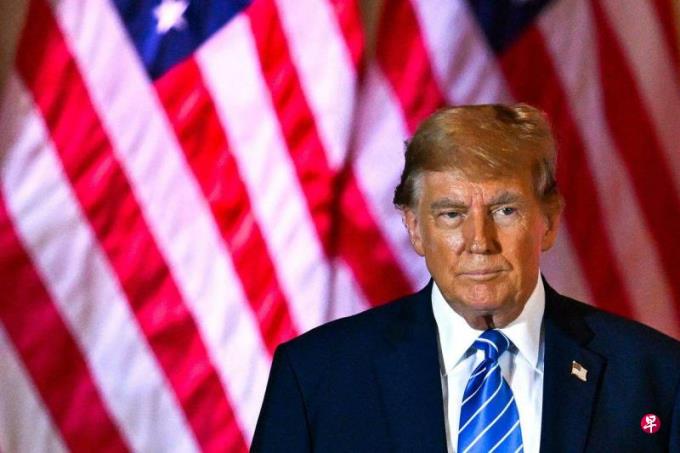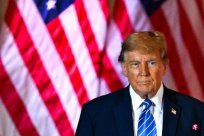
One day after day, one week, the court has become increasingly the front line that protects democracy and is not affected by populism and authoritarian molecules.In the United States, the Federal Supreme Court has recently heard the U.S. Congress Building Riot about Trump's participation in the state of the state's presidential election on January 6, 2021.A court of appeal ruled that Trump's statement of any action on the president's time to enjoy the exemption.
In addition, a court of New York State recently fined Trump's $ 354 million (about S $ 475 million) for financial fraud.In a case of Trump who was charged with a woman who had successfully sued him for sexual assault, the jury also sentenced to $ 83 million in compensation.Except for Trump to hold any senior position in a company headquarters in New York in the next three years, the above two rulings may deprive him of almost all cash assets.
At the same time, on the other side of the Atlantic Ocean, the British Conservative Government has always tried to pass a immigration resettlement bill, which aims to bypass the British Supreme Court to overthrow a ruling similar to legislation at the end of last year.In Israel, the Supreme Court recently rejected a amendment to the basic law that might weaken its own authority.In Germany, the Constitutional Court of the Constitutional Court can refuse public funds to the extreme right -wing and anti -democratic motherland.This triggered a guess that the court may accept similar cases involving the increasingly popular German alternative party (AFD).
The voting qualification case accepted by the Supreme Court of the United States may become one of the most important cases in the history of the United States.The role of Trump in the January 6 riots in the Supreme Court of Colorado will prohibit him from serving as the highest political position.
After accepting the case, the judge must be threatened to know that Trump has threatened. If the ruling is not good for him, it will cause "confusion" to prevent Trump from returning to the president's throne to make a ruling.But even if Trump's followers cause confusion, the United States aims to prevent the democratic system of instigators from being able to withstand the test.In contrast, if the judge overthrows the ruling of Kezhou, this seems very likely (compiled: the US Federal Supreme Court overthrowing the Koizhou Supreme Court on March 4 to ban Trump from participating in the 2024 presidential election of the Koizhou party in the early party party in the party.Selected rulings), a small number of voters in the key states will likely determine the future of American democracy.
Almost since the founding of the country, the courts and laws in the United States are closely related to political life.In 1835, Alexis de Tocqueville, a French political scientist, pointed out that "almost any political issues in the United States will be resolved sooner or later in the form of legal issues."This is by no means an exaggeration.In 1803, the Supreme Court clearly claimed in the case of Malibury's case of Madison that it had the right to review and overthrow legislation when necessary, so that it had mastered the ultimate arbitration power of the American Constitution and rules.
Although the United States has always been an excellent democratic country in the world, few other countries have adopted their judicial model.In the United States, the court's sovereignty is almost considered for granted, only occasionally opposing voices.However, many observers in other places are deeply disturbed by this: several men and women in black robes can ruin the legitimacy of the establishment of national banks or slavery.Although almost all democratic countries have constitutional courts, few countries have political super authority like the United States.On the contrary, they were asked to obey the elected officials.
However, populist politics has caused increasing pressure on the constitutional order of many countries, which has led to the increasingly more cases of the court's unprecedented ways to safeguard their own interests.The Israeli right -wing government attempts to prohibit the Supreme Court of "rationality on the government, prime minister or other ministers' decision -making", which is one of the typical examples.
In January this year, the Supreme Court of Israel overturned the law.The judges followed the back of the United States and ruled that the court instead of the Israeli parliament, the government and the president is the highest authority of the Basic Law of Israel.
People have always used the "lion under the throne" to describe the British court, but the ruling of the immigration resettlement law that overthrew government immigration last year showed that the judge would go to the front desk when necessary.The court ruled that the government would see the asylum to send the shelter to Rwanda and violate international and domestic law because Rwanda does not have the conditions for reorganizing a safe country.This is completely opposite to the statement of the Ministry of Foreign Affairs.
If the government of British Prime Minister Sunak successfully passed a bill that announced the "safe" of Rwanda, it is unclear how the situation will develop.Because there has never been a British government before before, it has passed a bill that recognizes the realistic bill (in fact, the number of Rwanda to the UK for political asylum alone has exceeded the number of people who want to place Rwanda).
If the British traditional parliament is established, the Supreme Court will be forced to accept this Eirise Midmark Wonderland.However, even if the judge is unwilling to disrupt the overall constitutional situation in this special case, the wider transfer of judicial power in the United Kingdom and internationally is obvious.
To survive this period when populism attacks democratic order, the court must take on the role of a righteous arbiter.They know that their ruling cannot depend on Trump or Boris Johnson's emotional impact.They must follow the guidelines of rationality, jurisdiction and law.
As the populist pressure is increasing day by day, the supernounced democratic accountability on the surface of the judicial institution is likely to be proven to be one of its fundamental advantages, not weaknesses.They may now be the last guarantee of democratic constitutional order.
Author Nicholas Reed Langen is a researcher of the Constitution: Constitution (2021 Re: Constitution), editor of Public Policy Review of the School of Political Economics of London, and the British Constitution writer of the Judicial Gap /P>
English Original: Judgment Days for Democracy
All rights reserved: Project syndicate, 2024.




